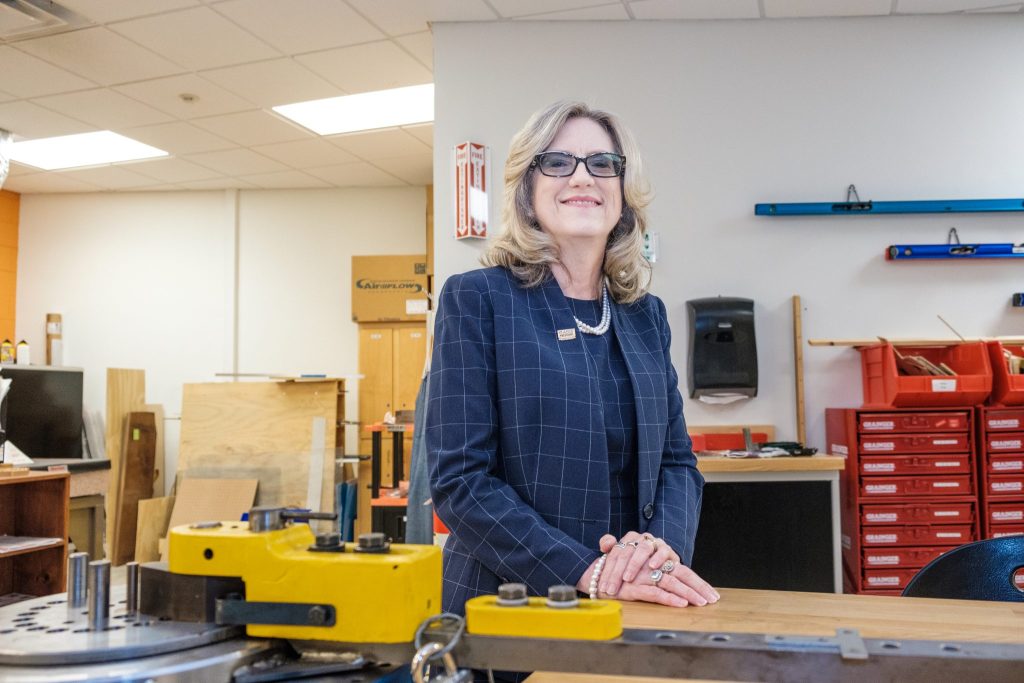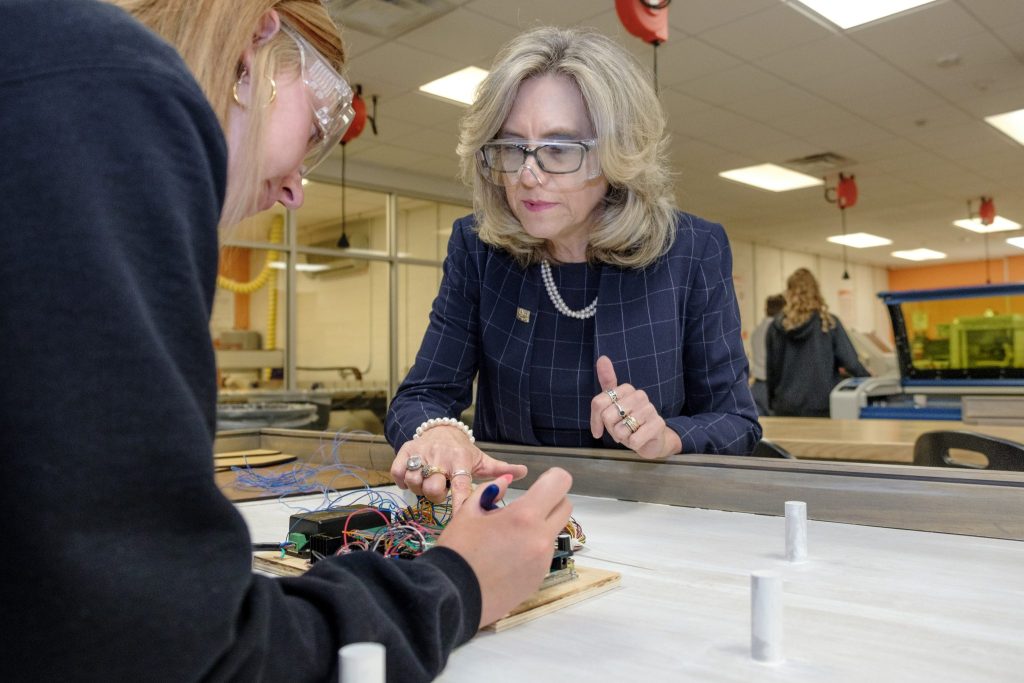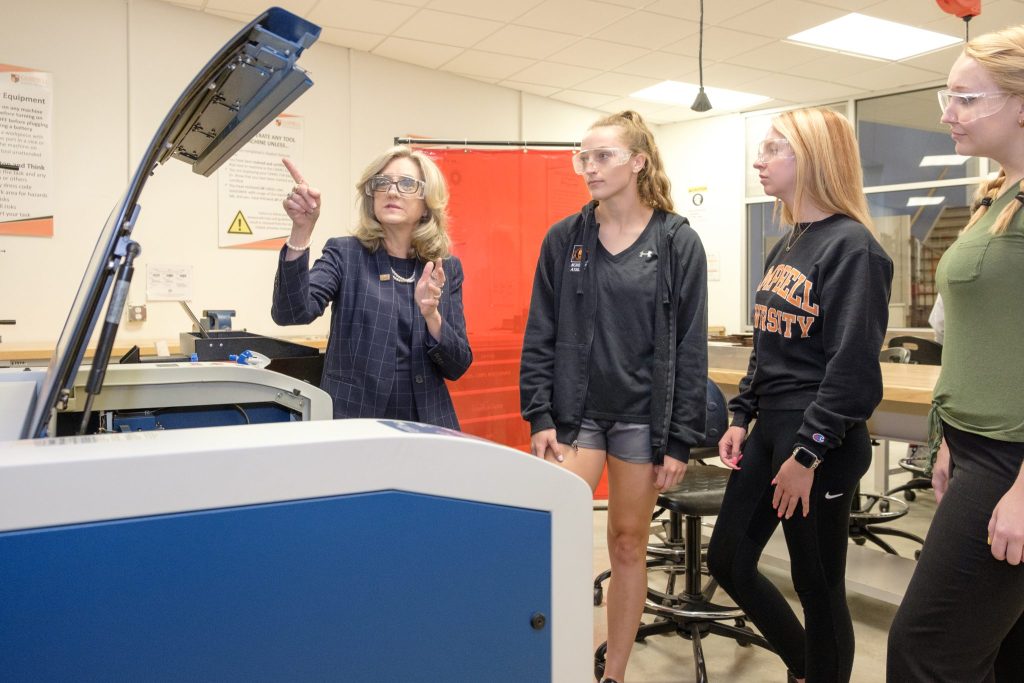The 2023 ABET Symposium will feature a keynote presentation by Dr. Jenna Carpenter, founding dean of the Campbell University School of Engineering. Carpenter’s research on integrated STEM curricula, in addition to her advocacy for diversity and equality in STEM, especially for girls and women, epitomizes the Symposium’s theme of “Building a Resilient World.”
Carpenter is a pillar in the engineering education community, currently serving as president of the American Society for Engineering Education (ASEE) and active involvement as an ABET Expert since 2011.
In addition to her leadership roles in several prominent engineering societies, Carpenter has received many awards in recognition of her essential work to advance the STEM fields. Most recently, the National Academy of Engineering (NAE) recognized Carpenter for her contributions to the Grand Challenges Scholars Programs (GCSP) with the 2022 Bernard M. Gordon Prize for Innovation in Engineering and Technology Education Award. Dreambox Learning named Carpenter one of its “10 Women in STEM Who Rock” in 2015 and she has been honored with the Sharon Keillor Award for Women in Engineering from ASEE.
We recently talked with Dr. Carpenter about her upcoming keynote presentation at the 2023 ABET Symposium, and here are some highlights from the conversation:
What should the audience expect from your keynote presentation at the ABET Symposium? How do you hope to inspire the audience?
I’m going to talk about the issue of weaving students in instead of weaving them out and talk about demographic issues, certainly diversity. We’ve tried to weave in students who we historically don’t attract very well, but we’ve made almost no progress, very little progress. There’s some data I’ll share with regard to faculty, for example, that says the big R1 schools at the current pace of change will never get the right number. We’re not going to get there, so we’ve got to change how we think about it.
I grew up in a small town and took every math and science class my high school offered, but they didn’t offer any courses in calculus. I couldn’t do anything about that, and my parents couldn’t do anything about it. And so when I got to college, I wasn’t well-prepared. It wasn’t my fault — I’d done everything I could do. But there are a zillion reasons why students arrive at college and haven’t enjoyed the opportunities that we’d like them to have enjoyed. We’ve got to change how we think about recruiting, admitting students, onboarding students, skill development for students, graduating students, curriculum — we can think about changing how we teach. And we’ve simply got to do that because if we keep doing what we’re doing, the number of students who we traditionally attract is going to continue to whittle away and decline. And we’re not going to be producing enough graduates to meet workforce needs.
What does the theme “Building a More Resilient World” mean to you?
We have eight values in our school of engineering, and resilience is one of those. We remind students that when you’re doing a complicated design, you’re not going to nail it right off the bat. You’re going to have to do your best, put together a prototype, try it out, see what works and what doesn’t. So students really need to get familiar with and comfortable with being resilient, because you’re going to run into roadblocks — things you didn’t expect, such as a rule, process or a budget that blocks what you want to do. Instead of being discouraged by that, you’ve got to figure out how to learn and pivot. We tell students that you need to fail early and often because you know you’re going to put together a good design if you have two or three rotations through the design sequence. Through the process, you learn a lot and then you come out with a much better product. But students want an “A” out the gate; they’re a lot of times hesitant to go through the process. And, of course, engineering is a challenging curriculum, so it’s okay if you don’t make straight As. You still want to do your best, but it’s okay not to make straight As.
Given the huge challenges we’ve got in the world, resilience is really important. We’ve certainly got a lot of sustainability, environmental challenges, fallout from the pandemic, economic challenges and challenges around the world with peace and prosperity. Even in engineering, we have a lot of changes around Industry 4.0 technologies and the way we do work is changing a lot. And we’ve got to be able to think about different ways to do things. Just because we’ve always done something some way doesn’t mean that it’s the best way, or that we can keep doing things that way, especially when you’ve got natural disasters happening. For example, I lived in Louisiana for 35 years, so for me it was hurricanes, or for California right now all the rain and the mudslides. We want to think as engineers: How do we design processes, systems and structures to be more resilient so they can handle a lot more chaos and a lot less uniformity than we’ve had in the past?
What are you most looking forward to at the Symposium?
I always just enjoy learning, seeing what the new ideas and the new thoughts are, what kind of cool things other people are doing. I always get a lot of good ideas. I can’t do everything I want to do today, but I’m always looking for things I can take home and do on Monday.
We talk a lot about sustainability and diversity. How do you see these topics as being interrelated?
I’m not sure that that’s the way people think about diversity and sustainability. I think a lot of people think of those as separate things, but we know from research that diversity is important for innovation. There’s a lot of research that shows the most innovative design teams, most innovative companies, are the ones that have the most diversity, because if everybody has a similar background, they tend to think alike. But if you bring in people with different life experiences, then the others look at the world differently and have ideas that you don’t have. So certainly in sustainability, you’ve got to have diversity, because there are challenging problems to solve.
And the United States can learn a lot from other countries that have done a better job of this, because it’s not been something that’s been valued a lot in a lot of places in the U.S. If we’re going to solve those challenges, then we’ve got to think differently, and thinking differently means you’ve got to have a lot of diversity of thought and experience to be able to come up with those challenging solutions.
Where do you see engineering education evolving over the next five to ten years?
I think that we really do have to try to change the way engineering is taught. In many schools, it’s still a very theoretical-only type approach. First of all, students don’t learn very well that way. They can memorize their way through that stuff but it doesn’t mean they really understand it, and they don’t know how to apply it. And in the real world, nobody’s going to sit you in the corner with a pencil and a piece of paper and make you solve a math problem by yourself.
So that’s why we do a very team-based, project-based approach at Campbell. Students learn all of the theory, but they also learn to apply it. We have them working in teams all four years so they are actually trained to work in teams after graduation. So we have these threads that run through the curriculum and by the time they graduate, they’re industry-ready. Of course, we also have students who go to grad school, and they’re ready to go to grad school as well.
We’ve got to embrace research, because we’ve got to figure out how to do a better job of attracting and retaining students. Then we’ve got to do a better job so they actually learn better and learn the skills and content that they need to be successful.
What are some of your primary goals during your term as president for ASEE?
One of the things I’m focusing on as president of the American Society for Engineering Education is working to weave students into engineering instead of weaving them out. We’re in the middle of a long demographic decline; we have got to figure out how to attract a much broader spectrum of students. And we have to stop filtering people out because they didn’t enjoy a lot of pre-college opportunities. We sort of use opportunity as a proxy for ability and, of course, there’s no connection.


